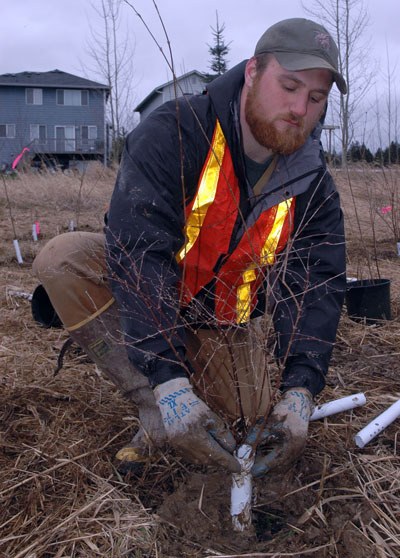MARYSVILLE — Volunteers organized by Sound Salmon Solutions descended upon the Qwuloolt Estuary Marsh for yet another day of planting native trees and shrubs on Saturday, Feb. 18, to prepare the area for the next steps in the ongoing Qwuloolt Estuary Restoration Project.
Sound Salmon Solutions, formerly known as the Stilly-Snohomish Fisheries Enhancement Task Force, is working with the Tulalip Tribes to plant 10 acres within the next 15 months at the Qwuloolt Estuary Marsh. The Feb. 18 planting of 550 native trees and shrubs within the 360-acre Qwuloolt Estuary Restoration Project area follows the planting of 850 native trees and shrubs in the area on Sept. 23 and 24 of last year.
“With about 40,000 plantings total set for this area, those planting days still represent a pretty small piece of the total picture, though,” said Kristin Marshall, habitat program manager for Sound Salmon Solutions. “We’ll be coming back to this area during the weekdays in March to plant another couple of thousand, but it won’t be as formal an occasion.”
With all the volunteers who arrived on Feb. 18 dressed in hard-wearing work clothes that they quickly got dirty by digging in the soil and kneeling in the wet ground to place the native trees and shrubs securely in those holes, “formal” might not be the first word that many would use to describe the day’s labors. The cold, muddy conditions made for a distinct change of pace from the Sept. 23 and 24 plantings in Harborview Park, just a few miles south, which proved warmer and drier.
“This area sees more stormwater runoff from the surrounding developments,” Marshall said. “Running right through it, we have Jones Creek which is an important tributary for coho salmon, and Allen Creek which drains into this buffer. What we plant here will help filter the copper and motor oil and other deposits left by all the cars around here.”
Stephanie Leeper, educational outreach assistant to Sound Salmon Solutions through AmeriCorps, touted the group’s upcoming Earth Day planting in the Qwuloolt Estuary Marsh on April 14, which will coordinate nearly a dozen partner organizations, including the city of Marysville and the Tulalip Tribes, as they staff interactive information booths on the plants, salmon and stormwater runoff of the area. In the meantime, she noted that local school groups are set to check up on the area and conduct plantings of their own within the week.
Area students often take part in Sound Salmon Solutions’ environmental restoration projects, and the group’s Feb. 18 planting was no exception. Arlington’s Kevin Berry, 20, was one of the members of the Everett Community College Environmental Club who donned gloves and dove into the muck to make sure Sound Salmon Solutions’ native trees and shrubs were placed properly and securely in the soil.
“I’ve done about 10 of these projects with Sound Salmon Solutions, but usually up in Arlington,” said Berry, who’s majoring in environmental science. “This is my first time out here in the Qwuloolt Estuary Marsh. It’s a rewarding experience. This is our home, and someone has to take care of it. What happens here will affect not only the wildlife, but the people.”
“I’ve always been concerned with the environment, but it’s been hard to find time until recently,” said Randy Rigler of Bothell, for whom the Feb. 18 planting was his first volunteer work with Sound Salmon Solutions in 10 years, since his son was still in school and they took part in such projects together. “I’ve always enjoyed working with this group, and with so many of these habitats slipping aways it’s important that we return them to their natural states.”
To learn more about Sound Salmon Solutions’ volunteer opportunities, contact Michele Harmeling, the group’s volunteer coordinator, by phone at 425-319-7696 or via email at michele@soundsalmonsolutions.org.



